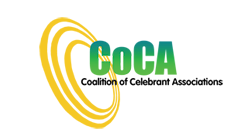VET Qualifications Criteria
The qualification and course units should:
- Lead to a job/vocation of a professional standard to meet current and future community needs. Celebrancy as a hobby or personal interest should be discouraged. A celebrant gets one shot only at getting a ceremony right!
- Meet the extensive requirements of the celebrant job description.
- Address the needs and expectations of a diverse and changing Australian community e.g. the needs of individuals, couples, families and groups from different socio-economic, educational, religious and cultural backgrounds across all life stage cycles in delivering inclusive civil ceremonies with appropriate rituals, respect, individuality and meaning. This includes same-sex ceremonies, catering for an aging population and other trends.
- Be assessed against level of responsibility, role complexity, associated tasks, combined with position required initiative, creativity and flexibility.
- Train an 18 year old (civil) / 21 years (religious) to be a competent Marriage Celebrant. People with appropriate prior knowledge and skills may gain recognition of prior learning.
- Address the challenges of meeting the VET streamlining requirements of 2012. Core units should be generic knowledge and skills needed by all celebrants and electives should be for specialty knowledge and skills. It is vital that areas of duplication be minimized or eliminated i.e. Core units need to deliver sound knowledge and skills for work across the three main life stages – births, deaths and marriages – to create ‘family’ Celebrants. Additional knowledge and skills for each ceremonial specialty should be elective units.
- First and foremost meet the needs of the industry’s primary stakeholders i.e. workers and employers, who in this case are one and the same. The needs of other related stakeholders, such as training providers, regulators, etc. should be considered but not take priority over primarystakeholders.
- Be recognised at the appropriate level within the Australian Qualifications Framework.
The nature of celebrancy work
The celebrant role is to:
- “assist individuals, couples, families and communities to adapt to life changes,
- whether that be a change in role, function or circumstances within the person/client’s** control or not,
- by facilitating, designing and/or delivering a ceremony or celebration or celebrancy related service appropriate
- to meet the physical, emotional, developmental, psychological/ spiritual, social and cultural needs of the client and guests.” Source: Celebrancy SMEG 2012.
** may be a family or community as in a single house fire or bushfire that decimates a whole community.
Whilst some celebrancy work involves co-operative approaches (eg public memorials), most involves the celebrant working in private practice with their clients with strict privacy and confidentiality provisions. Hence it is essential that celebrancy training defines and addresses the job’s diversity and builds career skills to deliver community needs.
Celebrancy - dynamic and rapidly changing role
Celebrancy is a relatively new career and one that has rapidly changed and will continue to do so.
Historically, marriage celebrants were needs-based appointments.
Today a celebrant is a family and/or community celebrant who leads a variety of ceremonies for their communities covering tragic events, memorials (usually at short notice), through to celebratory occasions of births, marriages and other life events. Diversity, flexibility and high professional standards are required to meet society’s changing needs.
See: Civil Celebrancy – A changing profession
Discrimination
The Marriage Act appoints three main groups of marriage celebrants who all provide the same legal service to the Australian community ie to assess couples eligibility to marry, witness and register marriages according to civil law. All of these appointments relate to only one aspect of the roles of these civil or religious celebrants.
Whilst the Commonwealth Attorney-General’s Department (AGD) is responsible under the Marriage Act 1961 and associated regulations to ensure people appointed as marriage celebrants are fit and proper persons and suitably trained, the legislation does not grant any authority to the AGD to determine the training needs of other aspects of the Celebrants’ diverse role.
Therefore, it could be viewed as discriminatory that the AGD has taken a stance on the qualification level for the overall celebrant role for celebrants appointed as Commonwealth marriage celebrants (predominantly civil) when the government requires little or no input to ensure religious and government (BDM) celebrants are professionally trained for their marriage work or any ongoing or other aspects of their BDM or church roles.
Ceremonies are one-time events – it must be right the first time!
Celebrants have a complex and important role in society.Ceremonies at which Celebrants officiate are one-off occasions such as a wedding, birth or death. If there is an error in a ceremony, it cannot be undone or re-done.
This places enormous pressure on celebrants. Sound, open communication between the Celebrant and clients; attention to detail in legal paperwork and the ability to sense-check both written and body language in client interviews, discussions and correspondence is vital to professional ceremony structure and delivery.
Ceremony errors can distress and in some cases, be detrimental to clients and their families and friends. For example, a funeral plays a strong part in the grief process and attendees can be emotionally vulnerable. Errors in weddings, particularly in the legal process, can result in litigation, fines and a view that ‘my wedding day was ruined’.
As sole traders, celebrants are fully exposed to the possibility of litigation should they fail to act in a professional, ethical, lawful and competent manner.
Therefore, core celebrancy training must assess and deliver celebrants who can perform to a high compliancy standard from day one, and in the case of funerals and memorials, to very short deadlines. Practical skills assessment is a high priority. We also reiterate the importance of assessment against a celebrants required skills set.Level of responsibility of the celebrant role
As a professional in private practice offering marriage, funerals and other ceremonies the celebrant works in isolation without direct or indirect supervision or support offered in many standard workplace situations. As a result, the celebrant carries FULL responsibility and associated liabilities to deliver the best services they can.The Marriage Act and Regulations clearly outline penalties and fines against marriage celebrants who fail in their role. Celebrants are also exposed in their other services (e.g. funerals, commitment ceremonies etc.) under Australian Consumer Law, the Privacy Act, the various discrimination Acts, the Copyright Act and other laws and are therefore similarly exposed to litigation if they fail to act in a professional, ethical, lawful and competent manner. Therefore, it is essential core training gives the breadth and depth of knowledge and skills to meet their full responsibilities as a professional celebrant.


